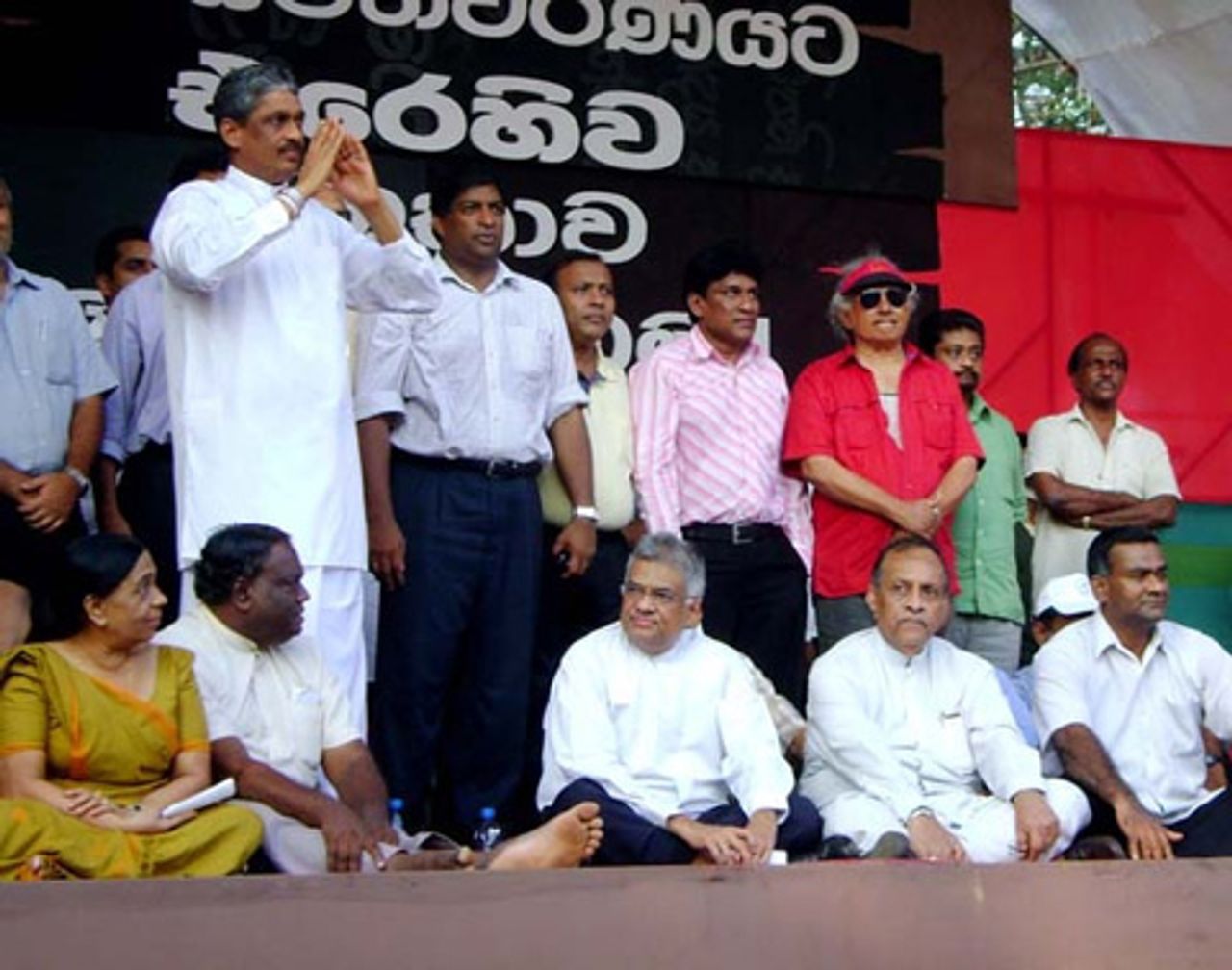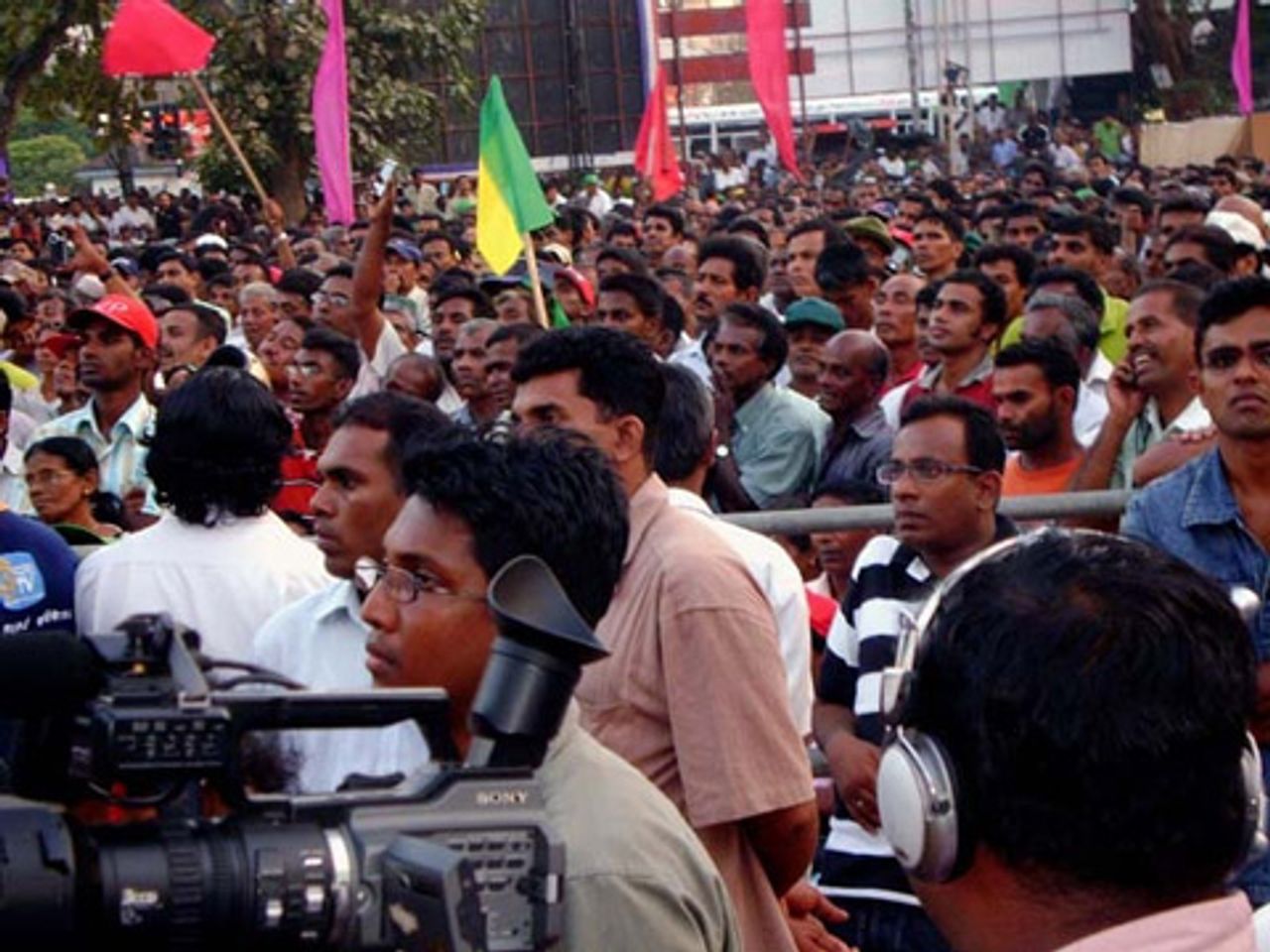Sri Lankan opposition parties, including the United National Party (UNP) and Janatha Vimukthi Peramuna (JVP), together with their defeated “common candidate,” General Sarath Fonseka, held a protest rally in Colombo on Wednesday to demand the annulment of the January 26 presidential election results.
The UNP and JVP, with the political assistance of the ex-left Nava Sama Samaja Party (NSSP), are seeking to cynically exploit widespread popular concern and anger over President Mahinda Rajapakse’s abuse of democratic rights and expanding crackdown on political opposition. Both the UNP and the JVP are well-known for their own anti-democratic methods. Moreover, Fonseka, who was the country’s top general until last December, would have just as ruthless in implementing the agenda of the business elite if he had won.
Around 10,000 people, mostly members and supporters of opposition parties, took part in the protests. Their slogans included “Condemn election rigging”, “Don’t accept the distorted result of the election”, and “We cannot let the king [Rajapakse] shut the mouth of the media”. Police refused to allow loudspeakers to be used.
According to the official results, Rajapakse won the election with a majority of about 1.7 million votes. During the campaign, his ruling coalition certainly exploited state resources and the state-owned media to the hilt. Undoubtedly, the government resorted to intimidation, violence and ballot stuffing—as did the opposition parties to a lesser extent. However, neither Fonseka nor the opposition leaders has provided evidence of electoral malpractice on a scale that would have altered the outcome.
Rajapakse won primarily because many voters did not regard Fonseka as an alternative. Both men ruthlessly waged the war against the separatist Liberation Tigers of Tamil Eelam (LTTE) that ended in its defeat last May. Rajapakse and Fonseka bear responsibility for the military’s indiscriminate slaughter of thousands of civilians and its abuse of democratic rights, including the operations of death squads that killed hundreds of people. Both made clear to corporate leaders that they would impose the burden of the present economic crisis onto working people.
 Fonseka standing (left), Wickremesinghe seated (third from right), and Karunaratna standing (red shirt)
Fonseka standing (left), Wickremesinghe seated (third from right), and Karunaratna standing (red shirt)On Wednesday morning, Fonseka and his supporters lodged a formal complaint with Election Commissioner Dayananda Dissanayake. Dissanayake, however, told a press conference that although some malpractices had occurred he stood by the election outcome. The opposition has indicated that it will mount a legal challenge in the courts.
The rally was dominated by the Sinhala chauvinist JVP, which provided the bulk of the protestors. Three of the nine speakers were from the JVP, repetitively claiming that election rigging had taken place. JVP leader Somawansa Amarasinghe rhetorically declared: “Despite the differences between the parties on this platform, we got together to re-establish the democracy in this country. We are not afraid to give our lives for the democracy as we did in the past… Prisons are not strange to us… A man dies only once”.
Amarasinghe’s demagogy about the JVP’s past is in part aimed at boosting its own flagging support. JVP members were last imprisoned and killed in the late 1980s when the party mounted a communal campaign against the Indo-Lankan Accord that stationed so-called Indian peace-keepers in the North and East. At that time, the JVP killed hundreds of workers, trade unionists and political opponents—including UNP and NSSP members—who refused to join its strikes and protests. Amarasinghe’s comments on Wednesday were laced with the same reactionary patriotism. He called on people to come into the streets “in defence of democracy and the motherland”.
General Fonseka was the main speaker at the meeting. He claimed that Sri Lankans had been robbed in the presidential election and vowed to take action against the electoral fraud thrust upon the people. “I will not allow those who did this to enjoy their victory for long,” he said.
Fonseka continued: “The president is not behaving like someone who has won the election with such a big majority. His actions and his retribution on opponents suggest that he is nervous.” Since election day, the government has accused Fonseka of attempting to orchestrate a coup against Rajapakse. Fonseka referred in particular to the sacking of 11 top generals that has sent ripples throughout the army.
 A section of the protest
A section of the protestIn an obvious appeal to the US and European powers for support, Fonseka referred several times to the souring of relations with “international community” under Rajapakse’s rule. “As Sri Lankans we had a reputation for democracy and decency among the international community. This Rajapakse regime has completely discredited that reputation. Now the international community has expressed its concern,” he said.
The US and EU have both voiced concerns about the crimes and human rights abuses carried out by the military during the war against the LTTE, as a means of exerting pressure on Rajapakse and sidelining their rivals—especially China. Yet, as the former head of the military, Fonseka is just as implicated in these crimes as Rajapakse.
UNP leader Ranil Wickremesinghe played a limited role in the meeting, speaking for just five minutes. This right-wing party is notorious for its own abuses of democratic rights, particularly in the late 1980s when it first collaborated with the JVP, then turned on it, unleashing a massacre of an estimated 60,000 rural Sinhala youth.
Wickremesinghe invited religious leaders and political parties to come together to safeguard “the people’s freedom”. It was a rather pathetic performance, mainly limited to exhortations and geeing up the audience with the slogan: “We need freedom, we need freedom”.
The impossible task of dressing up this right-wing platform as “democrats” fell to the ex-radical NSSP leader Wickremabahu Karunaratna, who appeared with a bold red shirt and cap along with some 15 supporters. “Despite our differences, I decided to get onto this platform on behalf of democracy. We will take this fight forward without making any conditions. We invite other leaders to also join us to continue to fight until we win democracy,” he declared.
For all the talk about “winning democracy”, Karunaratna’s appearance on the UNP-JVP platform will do exactly the opposite. By tying workers and youth to these discredited parties, the NSSP is attempting to block the emergence of an independent political movement of the working class—the only social force that is capable of fighting for democratic rights as part of the broader struggle for a socialist program.
Karunaratna is a veteran of such opportunist alliances. As the NSSP’s presidential candidate, he campaigned jointly with M. K. Sivajilingam, a right-wing dissident from the bourgeois Tamil National Alliance, who was promoting the LTTE’s failed perspective of Tamil separatism. Having denounced both Rajapakse and Fonseka during the campaign as being responsible for war crimes, Karunaratna abruptly shifted tack after the poll, announcing he would now support the general to “uncover the real election result”.
Throughout the campaign and subsequently, the Socialist Equality Party (SEP) has consistently opposed both the Rajapakse and Fonseka factions of the ruling elite, warning that they would be equally ruthless in imposing new economic burdens on working people and stamping out any opposition. Workers and youth cannot defend their rights by shackling themselves to either Rajapakse or Fonseka. Rather a complete break must be made with the Sri Lankan political establishment and its ex-left hangers-on, and the struggle taken up for a workers’ and farmers’ government to implement socialist policies.
The author also recommends:
Sri Lankan SEP replies to the United Socialist Party
[4 February 2010]
